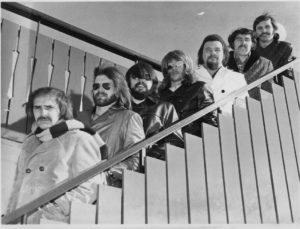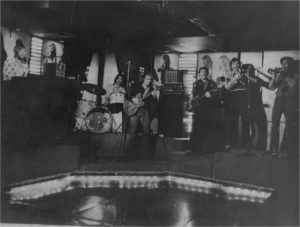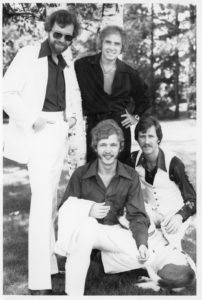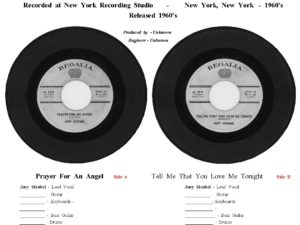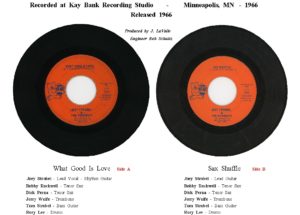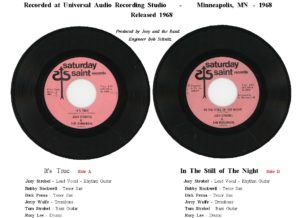Joey Strobel and The Runaways
Popular local club band
Contents:
History
Joey Strobel and the Runaways
Joey Strobel was born on June 24, 1939 in Brooklyn, New York. By the mid to later 1950’s, Joey was singing on street corners with friends. They also sang inside entrances to stores and elevators to the subway which provided natural echo chambers for the singers who covered songs by Al Jolson and Doo Wop songs like “Earth Angel” by the Penguins. They also sang at the amusement park, Coney Island.
A friend introduced Joey to a vocal group called the Overons and Joey auditioned for the group in a restroom at a theater where Alan Freed was putting on rock’n’roll shows. Joey sang “Crazy Love” in a high falsetto and joined the group. The Overons played at a movie theatre on Friday nights and sorority parties and at Italian lounges in Brooklyn. The lounges often held singing competitions.
Joey decided to get a guitar and learned to play it, taking lessons from jazz guitarists Sid Margous and Sal Salvador.
After a year with the Overons, Joey left the group and a year later they transitioned into the Mystics who scored a Top 20 national hit with “Hushabye” in the spring of 1959.
Joey kept busy, singing on recordings for various other vocal groups and writing songs.
“Prayer for an Angel” was written by Joey and included on one of the Mystics albums.
In 1960, Chubby Checker had a major hit with “The Twist” which started a national and international dance craze. Picking up on the new dance phenomenon, Joey played a song called “Twisting in Dixie” which was recorded by a New York group called the Crystals (not the Phil Spector group).
Sometime in 1960, Joey met Joe Villa, the lead singer for Joey and the Twisters. Joe Villa had been a member of a band called 3 Friends who recorded a song called “Blanch.” Joey Strobel joined the band on guitar and vocals. The group played at the Peppermint Lounge on 45th Street in New York, made famous by Joey Dee and the Starlighters who had a Number 1 national hit with another twist song “The Peppermint Twist” in early 1962. At one point, Joey and the Twisters were the house band at the club.
Joey and the Twisters came to Minneapolis in October, 1962 and played at the Jockey Club, a downtown venue. Their first night was October 22, the same night President John F. Kennedy gave a televised speech on national TV about the Cuban Missile Crisis.
The owner of the Jockey Club liked the twist band and began booking them. They played in New Orleans for a year including jobs on the same bill with Johnny Rivers and Johnny took an interest in Joey Strobel and his talent. Later on, Johnny asked Joe if he would like to join his band however Joey declined the offer as he was married at the time.
Back in New York, Joey appeared on a number of television shows including the Dave Garroway Show, Comp 7 hosted by Merv Griffin, and American Bandstand with Dick Clark.
Joey and the Twisters recorded some 45’s including one with “Bonie Maronie” backed with “Mumblin’”.
Joe and the Twisters played for around three years and then called it quits. One of the reasons was the management fees and having to pay double union dues – one for New York and another for the state they played the jobs in.
Joey recorded a 45 in New York that was released on the Regalla label. The A-side was a Doo Wop Teener song “Prayer for an Angel (Joey Strobel) and the B-side was “Tell Me that You Love Me Tonight” (a standard recorded by Vic Damone and others).
Joey was fond of Minnesota and decided to return to Minnesota with a new band – Joey Strobel and the Runaways. In the band were: Joey on guitar and vocals; Tom Strobel (Joey’s brother) on bass guitar; Dick Perna on sax; Dave Haberman on trumpet; Jerry Wolfe on trombone; Bobby Rockwell on sax; and Rory Lee on drums.
The band traveled to Colorado to play some jobs and then returned to Minneapolis where they were booked at Papa Joe’s (323 West Broadway). The club was owned by Joe Daszkiewicz.
1965: The band’s first night at Papa Joe’s was St. Patrick’s Day and there was a snow storm which limited the size of the audience. Within a week, the club is filled with large crowds.
October 17, 1965: Picture Magazine (Minneapolis Tribune) featured an entire issue under the banner “Our Swinging Night Life” which took an in-depth look into the music scene in town. On the cover was a photo of Joey Strobel and band playing with dancers shoulder to shoulder on the dance floor. The photo caused some problems, as the photo shows a number of people who were dancing with someone other than their spouse or significant other. A lawsuit over the photo was filed against the newspaper. Joey asked the management for a copy of the photo but his request was denied.
June 14, 1966 to December 24, 1967: The group was booked at the Pink Pussycat at 1331 Hennepin Avenue, owned by Marv Goldman.
One night at the Pink Pussycat, a local songwriter named Bill Normandin stopped by the club and presented Joey with an original song he had co-written called “What Good is Love.”
Early, 1966: Joey and his band recorded two songs for a 45 with Marv Goldman picking up the tab for the session and the pressing. The A-side was “What Good is Love” written by Bill Normandin and Tony Perronteau and arranged by the band and the B-side was an instrumental written by Joey and Bobby Rockwell called “Sax Shuffle.” The two songs were produced by J. Lavalle and the 45 was released on the Bear label (owned by Leiberman Enterprises).
May 7, 1966: “What Good is Love” hits Number 19 on the KDWB radio chart. Some stations in town play the B-side of the disc.
January 18, 1967 A live performance of the band was recorded by Mike Jann at the Pink Pussycat with the following songs:
“How Could I Forget” (unknown)
“You’re So Fine” (Chiffons, a reworked version of “He’s So Fine.”)
“La Bamba” (Ritchie Valens)
“Here in My Head”
“Peepin’ and Hidin’” (Lloyd Price)
“Memphis” (Lonnie Mack)
“These Arms of Mine” (Otis Redding)
“98.6” (Keith)
“Hold On I’m Comin’” (Sam and Dave)
“Mustang Sally” (Wilson Pickett)
“Kansas City” (Wilbert Harrison)
“Midnight Hour” (Wilson Pickett)
February 11, 1968 to November 24, 1968: The band is booked at George’s in the Park (1700 Excelsior Blvd. St. Louis Park) which is owned by George Schoenberg and a co-owner. The venue features a stainless steel dance floor and a light show controlled on the stage by Joey.
The band released their second 45 in 1968, this time on the Saturday Saint label. On the A-side was “It’s True” written by Bill Normandin and B. Phillips and on the B-side was “In the Still of the Night” a song written by Cole Porter. The local radio stations ended up playing the B-side more than the A-side.
December 1968 to January 4, 1969: The band is booked at Duff’s (21 South 8th Street) which is owned by Joe Duffy.
June 3, 1968 to July 22, 1969: The band plays at George’s in the Park.
September 13, 1970: The band plays at George’s in the Park.
On stage, Joey usually wore a grey sharkskin suit and a black shirt with a black tie. At one point in time the band members all wore powder blue vests and platform shoes. At one point in time, a manager at Georges in the Park convinced the group to wear Canary colored suits even though Joey disliked the look.
During a job at Georges in the Park, a Canadian business man stopped in and liked the band and booked them at a club in Winnipeg for three or four months in the middle of winter.
1970: The band was nominated for a Connie Award in the category “Best 21 and Over Band.” Also nominated were: Sir Raleigh’s; Big Island; XL-5; Dave Mark Syndicate; Danny’s Reasons; and Zarathustra. The Sir Raleigh’s went home with the award that year.
April 29, 1971: The band was booked at the Filling Station (1401 Hennepin Avenue). The club was built by Marv Goldman after the Pink Pussycat closed. The new music venue included a piano bar that featured local piano player and singer Judy Happe.
September 7, 1971: The band was back at George’s in the Park.
May 30, 1972 to June 1, 1972: The band was at The Hopkins House.
October 10, 1972 to April 2, 1973: The band was at George’s in the Park.
1974: George’s in the Park went through a change in ownership and Joe Duffy became the new owner and the club was renamed Duff’s in the Park.
1974: The band played at Duff’s in the Park.
Joey checked out some of the other local bands playing in town including the XL5 at Cascade 9 on Hennepin Avenue who took over the job as house band after the Del Counts long run as house band had come to an end.
Following Duff’s in the Park, the band is booked at the Rusty Nail in Crystal, a north suburb of Minneapolis (5630 Lakeland Avenue North – Highway 52 and Bass Lake Road).
Mid -1970’s: Joey finds that jobs for horn bands were getting scarce and some venues had closed down, some had changed owners, some changed music styles, and some eliminated live music all together and made the change to discotheques as the 1977 movie (and soundtrack) “Saturday Night Fever” fueled yet another new dance craze.
With changes in the local live music scene, Joey decided to make a major change and reinvented his show to “Chez Joey” (French for the House of Joey) and performed lounge music with Joey on lead vocals, lead guitar, and percussion; Jeff Knutson (and later Jimmy Hamilton) on keyboards; John Townsend on bass guitar; and Nels Efforts (and later Howie Foss) on drums. Joey covered popular songs by Frank Sinatra, Tony Bennett; Lou Rawls and others. The combo played at the Orion Room on the top floor of the IDS Center and at the Radisson Hotels in the Twin Cities including the Carousel at the Radisson in downtown St. Paul.
1985 to 1993: Joey joined Midas Touch, a local band that played a variety of music and eventually were the house band at Mancini’s in St. Paul on West 7th Street. In the Midas Touch were Joey Strobel on lead guitar and vocals; Dennis Donovan on keyboards and vocals; Chuck Schneider on drums; and Chuck Adams on bass guitar for 3 years, followed by Alan Tosal on bass guitar.
1986: Joey decides it was time to leave the music business and moved to Iowa to open up a restaurant. He traveled back to Minnesota to play jobs with Midas Touch.
At age 53 Joey decided to pursue a job in law enforcement and enrolled in the Iowa law Enforcement Academy in Des Moines, Iowa for three months of training. After graduation from the Police Academy, Joey became a police office and then Chief of Police in Lansing, Iowa.
At age 65 Joey retired from law enforcement and ran for city council and then became mayor, followed by a job driving a school bus up until 2017 when he retired.
NOTE: The job dates listed above are a partial list only.
UPDATE:
Joey is retired and living in Iowa with his wife. They met at George’s in the Park.
Written by Tom Campbell
Version 1. April 28, 2018
Version 2. June 17, 2018
Version 3. August 18, 2018
Copyright 2018 by Thomas R. Campbell
No portion of this webpage my be used without permission.
Photo scans courtesy of Joey Strobel.
Photos (Click a photo to see it full-screen, then click the arrows to see the next one.)
1970: Outside of G.G.’s in Winnipeg, Canada
Left to right:
Joey Strobel, Rory Lee, Dave Weizer,
Terry Hayes Johnson, Dick Perna,
Tom Strobel, Jerry Wolfe
1969 – 1970
Joey and band at George’s in the Park
St. Louis Park, Minnesota
Chez Joey (House of Joey)
Mid 1970’s
Top – left to right:
John Townsend, Joey Strobel
Bottom – left to right:
Jeff Knutson, Nels Everetts
Recordings
Bandtree
Where are they now?
Joey is retired and living in Iowa with his wife.
Tom Strobel lives in Texas.
Dick Perna passed away at age 37 in 1980. He was living in Denver at the time. Dick played with Joey Strobel for 8 years and then Lamont Cranston for 3 years. Dick was a native of Princeton, New Jersey.
Rory Lee – deceased.
Dave Weizer – deceased.
Bill Normandin passed away at age 73 on May 14, 2016. Bill was living in South Minneapolis at the time.
-
Interview
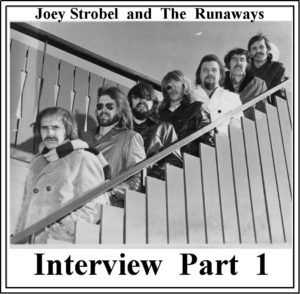
Interview PART ONE – Time = 14:58
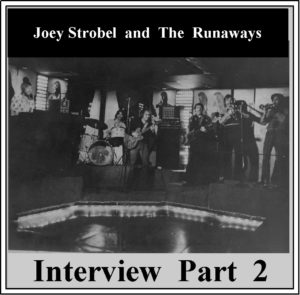
Interview Part TWO – Time = 15:48
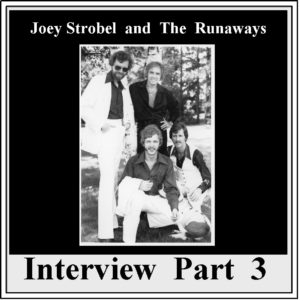
Interview Part THREE – Time = 16:56

